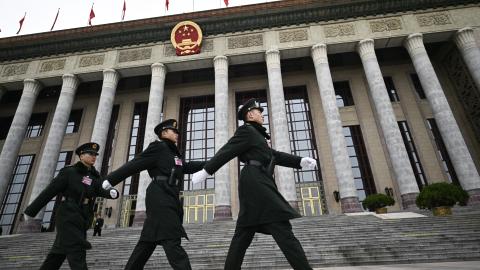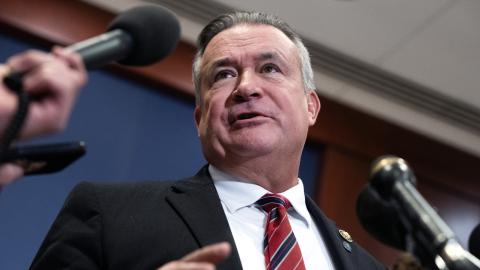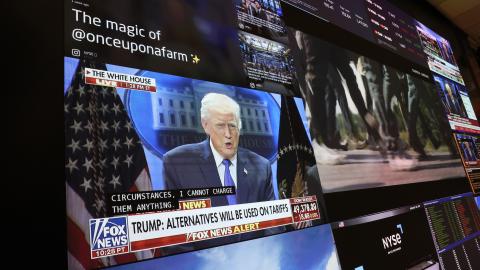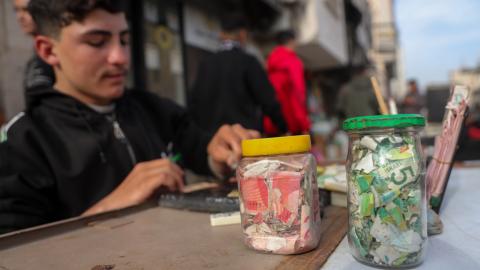
How to Deter China Economically with Representative Frank Lucas
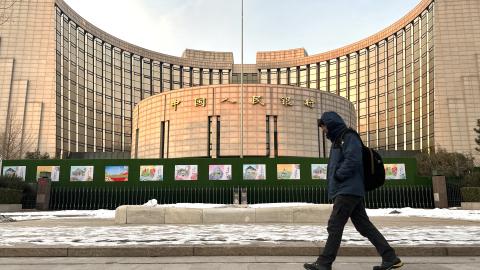
United States Representative, Third District of Oklahoma

Senior Fellow
Thomas J. Duesterberg is a senior fellow at Hudson Institute and an expert on trade, manufacturing, economics, and foreign policy.
The Chinese Communist Party’s rise poses the greatest economic, political, and national security threat to face the United States in a generation. How can Congress deter China’s military and economic aggression? What legislative initiatives could safeguard American interests and contribute to a free and open Indo-Pacific? What financial and economic measures can the US implement to deter Chinese aggression against Taiwan?
Join Representative Frank Lucas (OK-3), the chair of the House Science, Space, and Technology Committee, a member of the House Financial Services Committee, and former chair of the House Committee on Agriculture and Senior Fellow Tom Duesterberg for a conversation on steps Congress could take to protect American economic interests and defend Taiwan’s vibrant democracy from an increasingly belligerent China.
Event Transcript
This transcription is automatically generated and edited lightly for accuracy. Please excuse any errors.
Tom Duesterberg:
Okay. Good morning everyone. My name's Tom Duesterberg. I'm a senior fellow here at the Hudson Institute. It's my privilege today to be here with Congressman Frank Lucas, who's the longest serving member of the House of Representatives on the Financial Services Committee and the Agriculture Committee, and he is the chairman of the House Science Committee. Our focus today is on China, but I think the conversation will probably be a little bit more broad-ranging than that. So Congressman, welcome. It's a pleasure to be with you. I thought I would start by quoting something you said last year in your first hearing as chairman of the Science Committee, your opening statement in February of 2023. You noted that China is outspending us out, researching us and out educating us when it comes to STEM PhD graduates. We could observe as well that we lack a skilled workforce to build advanced products like semiconductor plants and nuclear plants. What are you thinking of and what is the committee thinking of in terms of ways to turn this around?
Frank Lucas:
Thank you, Tom for being here and it is a critical issue in a world where technology advances ever so much faster. I like to think of the Science Committee as the fun committee because it's about the future. A lot of times in Congress we argue about things in the next five minutes or 15 minutes or sometimes five hours if we have a forward focus. But Science Committee is about the future. Our workforce and our technology force is absolutely critical. Making more investments through the National Science Foundation, making sure the research institutions have the resources they need is just absolutely important.
I've had constituents occasionally tell me in town hall meetings and I do a lot of those. Why worry about that? I mean, Corporate America's going to do this and do that, and my response is "It's the universities in this country that produce the bachelor's and the Master's and the PhD's. We use those institutions to develop this group of scientists, of technologists, then that the rest of the economy benefits from." The Chinese have figured that out. They know that the miracle that is the American economy is a reflection of how much we've invested since the 1930s and they're trying to outspend us. Not a bad strategy if it's them, but it's our responsibility to compete and keep up and advance forward.
Tom Duesterberg:
Another part of the Chinese strategy though is to take advantage of the openness of our university system, and I think you noted in your remarks that something on the order of all PhDs granted in the United States in the science and engineering and mathematics fields are for foreign students and Chinese are among the leaders in that, but they're also sending hundreds of thousands of undergraduates to our universities as well. Do we need to think about ways to make sure that those students are not acquiring technological secrets that in the long run are detrimental to the National Security of the United States or the technological leadership of the United States?
Frank Lucas:
Oh, absolutely Tom. And those are the issues that we have been and continue to struggle with in the Science Committee. And when we pass major pieces of legislation, think of chips and science, the quantum leap forward in trying to advance the manufacturing of advanced computer chips, semiconductors in this country and the developing of the workforce. How do we make sure that the university communities in particular, how do we make sure that they know the students that they have? How do we make sure that industry then when using these Federal dollars, they know the integrity of their students? It's a never-ending struggle and it continues now and it will continue. I suppose if you believe that imitation or thievery is the ultimate form of flattery, then we're being moderately flattered by the folks in China these days, but it's flattery, we have to survive.
Tom Duesterberg:
One thing I observed when in looking at our manufacturing industries, which include technology industries as well, and hopefully with the new interest in the semiconductor field and some of the more advanced technologies. We're going to need more students enrolling in the courses that lead up to mostly the research, but also in the construction field for instance. We have to have skilled workers to maintain, just maintain the equipment, say in a semiconductor factory, but a lot of American students don't like to go into those tough fields. Do you have any thoughts on how we can motivate our students to enter those fields?
Frank Lucas:
It's hard. It's challenging work. I think it's a part of industry's responsibility to explain to future students, potential students, just what the reward is both economically and intellectually to pursue these fields and the stability. There will always be need for additional scientists and engineers and mathematicians and technologists. Making sure that these young people understand that if the public had half the appreciation for the nature of these fields that maybe they do being a professional sports star, then we would've had that same level of enthusiasm to join the industry.
Tom Duesterberg:
Okay. Earlier this year, your committee sent a note, a letter to the director of the National Science Foundation, and I'm not going to attempt to pronounce his name, so that I don't mispronounce it. But it was a strong letter and the subject was the research that was being done in this specific case at the University of California Berkeley. And it appears that a fairly large amount of money has gone from Chinese companies into this research institution, which is involved amongst other things in semiconductor related research. The CHIPS Act requires institutions of higher education to report any foreign financial support of $50,000 or more to the Director of the National Science Foundation, and it appears that monies that have been spent on this joint research lab that includes not only Berkeley but Texas, A&M, and some other American higher education institutions. Did you ever get a response to this letter and is this a major problem that the Congress needs to address more forthrightly in terms of Chinese money going into American universities?
Frank Lucas:
First off, Tom, that particular letter, this is still an ongoing process, and a big part of Congress's responsibility is oversight. Doesn't matter which agency of government, doesn't matter which resources. As long as the taxpayer's dollars are involved and as long as the National Security of the country's at stake, oversight is a responsibility. And we're attempting here, I guess the polite way to describe it would be to change the culture. Most academic institutions are resource starved. They're always looking for additional resources to do their research, to develop the skills and the student body force, the academic group they need. Trying to make sure that they're aware of where it comes from and understand that there are limitations on where money can come from and how it can be used because after all, if you buy into a project, wherever you are, wherever you may come from, obviously you have a ownership stake in the result. And leveraging taxpayer dollars in such a way to gain insights and expertise to then export whether it's the people or the technology itself is not in the best interest of the taxpayers.
Tom Duesterberg:
What are you hearing from your friends in the university community about when questions like this are raised and larger? Questions about technology being transferred from our great university systems to China? Are the leaders of our universities and research labs for that matter, aware of the issue and is there more concern than there was say 10 years ago about?
Frank Lucas:
Absolutely, there's more sensitivity than a decade ago, than even five years ago. We're working hard to get their attention and I believe that we have it, but if you're the leader of a comprehensive research institution, you've got a balancing act between your academic community, your sponsors, whether it's the state or a private entity, your grant providers that you work through. And they too are having to rebalance that relationship amongst all the entities, but they know that we own the Science Committee and I think the United States Congress in general mean business on this. There have been too many instances not worth going into today, where technological breakthroughs in the United States have led to dramatic economic gains in other places around the world. That's not how it's going to continue to work if we on the Science Committee have any control over the situation.
Tom Duesterberg:
Okay, turning to a different subject. There was an election a couple of weeks ago in Taiwan and seems to have been a free fair election and the ruling party retained power. China has been increasingly aggressive, at least rhetorically but not limited to rhetoric in the last year or two. What should we in the United States and Congress be thinking about in order to dissuade the Chinese from their aggressiveness towards Taiwan?
Frank Lucas:
I think Tom, we have to adopt a more proactive set of measures to send a clear signal that an invasion of a democracy, a market economy, an entity that as you noted freely elected their president not many days ago, will not be tolerated. We all learn from our experiences, and I think a number of my colleagues after watching the Russians invade the Ukraine and the activities that we took that were reactive after the fact. Trying to use international institutions and standards and a variety of things to get the Russians attention, I think most of us realized that was too late. So, in the circumstances of Taiwan, the House recently passed the bill of mine, the Protect Taiwan Act, basically to say that from a financial services institution perspective, if China invades Taiwan, the US representatives on everything from G20 to the International settlement banks, to all of the financial institutions that we're a part of will work to expel them. To proactively say, if you want to benefit from the market economy from an open world society, then you have to play by the rules.
And if you are not going to play by the rules, then you can't be a part of these institutions anymore. By the way, I would note Tom, that it was not just joining the WTO, but another, a number of other international institutions in the last 30 years that enabled the Chinese to dramatically grow economically to, while it may not be the same standard of living for the rest of Asia or the rest of the world but to dramatically improve the standard of living for the typical a person in China. They have benefited from our open society. So, if they're not going to be a part of our open society, they should not be able to economically benefit from the chaos and destruction that they could bring. I don't like wars, I want to prevent wars and I want to send a signal. You can't be a part the club of world economic powers if you act like a tyrant.
Tom Duesterberg:
China has not limited its efforts to trade as you implied. They've become more active around the world and they've set up sort of parallel institutions, if you will, to the World Bank, the IMF, and they're trying to set up, if you will, something resembling a block, an economic block. And they try to wean away lots of countries, they have friendship without limits with our friends in Russia, our former friends in Russia. They're the leading provider of development finance in the world now, and they frequently will try to get the World Bank and the IMF and indeed our commercial banks when their development finance loans go south for us in the west to bail out their banks through these parallel institutions. That's a mouthful that I've put on the table here, but how would you react to this? What should we be doing to counteract China's effort to undermine the Bretton Woods system?
Frank Lucas:
Well, first of all, Tom, you're exactly right. The Chinese operate by different standard than the rest of the world. After the second World War, the World Bank International Monetary Fund, a variety of institutions were created so that the more developed economies could help the rest of the world economically catch up, so that we could all enjoy the kind of stability that comes from prosperity. I've watched for a number of years in Congress as the Chinese have aggressively pursued their so-called economic development agenda. They have a tendency to go after potential customers or candidates for loans, however you want to describe it, who may not necessarily always have the strongest democracies, the most reflective governments of their people. Now, what do I mean by that? The terms it would seem to me on many of these loans are rather lavish in the spending ports, roads, of mines, railroads, a variety of things.
The terms are rather lavish in the amount of money given, but the interest rates and the collateral required. Tom, these are not IOUs, these are mortgaged loans they're giving. Set circumstances up where perhaps in the short run, the leadership of some of these places and the name of laying their hands on all that cash are not focused on the long-term business impact, and they get caught in the jam. I didn't use the phrase loan sharking, but they get caught in a financial jam and the same country that does not want to participate in the international institutions where we give the kind of terms that are designed to help people improve themselves, then want the, I didn't say victims, the customers to turn to the international institutions to loan them the payment money.
Oh my goodness, Tom, that's not how you develop the world economy. That's creating a empire reminiscent of the colonial period, which by the way, their relationship with the Russians is fascinating to watch as it develops. And the war in Ukraine has accelerated, the Chinese are prepared it appears to buy every raw resource that the Russians can provide, and the Russians are becoming more and more dependent on the manufactured products coming back from China. Wasn't there a term 200 years ago for that? It looks almost like the colonial model.
Tom Duesterberg:
Well, it does. What should we be doing? The United States and its allies either sort of collectively through the G7, the G20, or through the international institutions like the World Bank to offer a better alternative to the development finance efforts of the Chinese? We talked a little bit earlier about the Export-Import Bank and the importance of that. Could you comment on what we should be doing better?
Frank Lucas:
We reauthorized the Export-Import Bank in the United States rather easily, but the previous reauthorization was a multi-year struggle. Matter of fact, I and one of my colleagues in Tennessee had to use an arcane procedure called the Discharge Petition to bring the reauthorization to the floor where it passed overwhelmingly. Export-Import Banks or along the lines of what the United States uses in a variety of other countries are designed to fight off unfair competition around the planet to encourage growth and exchange. We have to use all those tools, plus in the international institutions, we have to make sure that if, and it's not just China, if anyone is participating in those, that they're conducting themselves I think in an equitable fashion across the spectrum.
You can't just be a part of it when you need to write a check or when you need someone else's check covered. And we also and I believe need to spend more time working with the international business community and for that matter, the international community in general, government-wise, to explain the terms that are available and all the options out there, so that they realize fully what they're getting themselves into. That the ability to lose control of your chief resource perhaps in your country or your chief asset and lose it for decades or generation, how devastating that is.
Tom Duesterberg:
In the last couple of weeks related to this, the Biden administration announced that it was freezing all the applications for either enlarging or building new LNG export facilities, and also earlier the administration had basically told its representatives in the World Bank and in Ex-Im not to support any development of fossil fuel projects around the world. Are these good moves for the United States to make and is this what people in the developing world would like to see from us?
Frank Lucas:
First off, Tom, a couple of disclaimers. I'm from Oklahoma. We are an agricultural producing area. Every wheat, cattle, grain, cotton. I'm also from Oklahoma where we are big producers of traditional energy, crude oil. We set on top of an ocean of natural gas. If the price were high enough, we could produce an amazing amount of natural gas. So, I'm a commodities exporting region, in all fairness upfront about that. Also in my role on the Science Committee, I am focused as the committee is on the future of energy in general. So, when I discuss my science hat, I talk about things like fusion. We are working as a committee, as a nation for that matter, the modern scientific world on the next generation of energy. When we are able to combine atoms, fusion as opposed to splitting atoms, fission, then suddenly we'll have an unlimited, totally clean source of energy. But that takes investment and it takes time to get there.
Step back now to the current set of circumstances. If I show my righteous indignation over the Biden administration's efforts to slow down the export of natural gas, yes, it's because we sell a lot of gas in my part of the country. But it's also because where gas is used to substitute for other fossil fuels, you see the emission levels come down. That's the biggest part of the reduction in emissions in the United States is because we shifted from coal to natural gas. It's also a geopolitical military issue when our allies are dependent on natural gas, for instance, from places like Russia, that's a terrible, terrible anchor tied to their ankle. And the fact that we can supplement their sources or offset those sources, provide stability for our friends around the world. And in the final issue, of course, is back to the question of the environment. Selling natural gas means people are burning less dirty fuels, so by restricting the export of natural gas, we're actually putting more crap in the air. So, I'm horrified all the way around, but elections have consequences every four years.
Tom Duesterberg:
So, is the Congress looking into this executive order, I guess it was?
Frank Lucas:
Yes. The challenge we have is we have a small Republican majority in the House. The other side controls the Senate and their party's president is at the White House. So, we're going to take action, I think, in the House, but we only control one half of one third of the government right now as Republicans, just to be upfront about it.
Tom Duesterberg:
Okay. Let me go back to Taiwan for just one more question, and it's broader than Taiwan, but there have been intermittent discussions with the Taiwanese about something approaching a free trade agreement with that island democracy. And there's also a more general question of what we should be doing on the global trade front, again to try to fight back against the Chinese efforts to build their own trade blocks. Should we have a free trade agreement with Taiwan or should we think about going back to the TPP, the Trans-Pacific Partnership and find a way maybe to renegotiate it a little bit and rejoin that?
Frank Lucas:
In all fairness to, as I mentioned earlier, I am from an export region, energy products and ag products. So, of course I want to sell my surpluses into the world market, otherwise I have no prices. I believe that the international trade is in the best interest of everyone. The devil, of course is in the details. How do you make sure that it is not just free, but it is equitable, it is fair? That comes down to the people who are negotiating the agreements. And in our American system, that's a reflection of the people, the President of the United States, places in those positions of responsibility. We should be negotiating with everyone who shares our perspectives in the world. Everyone who has a reason to do business with us, we should be negotiating these kind of a agreements. But they have to be equitable. They have to be call it fair if you want, whatever, but we should be out there because clearly when we step away from an opportunity, someone comes and fills the void, and that's to our disadvantage in every worker, every farmer, every individual in the United States.
I'd go one step farther and say, Tom, I've been around long enough that I've watched a lot of things unfold over the last three decades and even before I came to Congress. Like many of our friends today were observers of the fact of sort going on. The effort, I think to let the Chinese into the WTO, into all of the international institutions was the assumption that if they were able to participate in the market economy, if they were able to interact in these trade relationships, that it would not only create more opportunities for the rest of the world. But it would create opportunities for the Chinese government and the Chinese people, most importantly. Raise their standard of living, help them advance into the market economy world. It's still an old Marxist, communist political system, but pull them into the market economy and that they would understand the advantages of being a part of the world, of being a part of the nations of the planet and that they would gain from that.
It's almost as though the need for political control has superseded the best interest of the people and the course of events, not just in the region but around the world. So, they've used sort of a mercantilist system, surely someone's an ancient history, an ancient econ history person in the room to drive and bring resources home, but they've almost done it in a greedy way. And it's been contrary to the best interest it would seem to me for much of the planet, and that was no one's intention. I think the people who made those decisions decades ago thought that they could take everyone to a new level of existence and a new international community hadn't worked that away, Tom.
Tom Duesterberg:
Well, let's dig in a little further on that and maybe get to some of the issues that the financial services committee is grappling with. China has since they joined the World Trade Organization sort of has a practice of building up overproduction and for instance, the manufacturing sector and then exporting their way to prosperity, but they've also limited access to their own market to the extent that they're able to do it in financial services for instance. The agreement to join the WTO. They were supposed to immediately within a short period of time, open their financial services system. They never really did until the last few years. So, when you talk to business people who are active in China or trying to be active in China, what are they telling you about the ability to operate on some basis of reciprocity inside China and what conclusions should we draw from their reactions?
Frank Lucas:
When you get the business community off to the side in a variety of industries and you have that to the point conversation, it becomes quite obvious that the model that's been used for all practical purposes requires that if you make investments in the country, you can never be the majority owner of the investment. You have to bring your latest technology. If you're manufacturing something and that manufacturing technology, that proprietary whatever then becomes the property of the company where you no longer or you've never owned a majority of the company, that there are limitations on how you can move your resources out if you make money beyond the basic manufacturing issues. It is a really complicated environment and most people that I have conversations with, when you really press while they want to have access to that billion plus person population, potential consumers, they also understand that the majority of their products, goods, services flow out of the country and that they're subject to not really controlling what's happening.
Side caveat. In addition to being chairman of the Science Committee, I should say long serving member of financial services, I'm a former chairman of the Ag Committee. One of the fascinating areas is in international ag trade is the cotton industry. We produce tremendous amounts of cotton in this country along with a number of other countries. The Chinese are major, major buyers in their textile industry, but they maintain a massive stockpile of cotton on hand. They don't want a supply disruption of raw material coming in, but they also use all that warehouse cotton to affect the international market by the signals they send over what they're not going to purchase this year or tomorrow or what they might sell out of the warehouse back into the international market. They do a really good job of keeping a lid on the price of the input. Really aggressive.
Tom Duesterberg:
You know more about this than I do, but I understand that a lot of the textile industry in China is in places like Xinjiang where their treatment of the local population is colonialists, let's put it, since we've gone down this path. Should we, even in the case of the textile industry, should we be fighting back harder against them because they use forced labor probably pretty broadly and maybe because they're manipulating the price of cotton?
Frank Lucas:
Well, let's just say, and again, remember I'm from an export-oriented region, so moving product into the world market's critically important. We're constantly subject to threats over happening, things happening in different sectors. But nonetheless, if you're going to be a part of international institutions, if you are going expecting to be able to use the market economy access around the world, then you've got certain standards you need to meet. I'm not a member of the foreign relations committee. I'm not on ways and means, so I'm not really in a position to discuss the issues that they addressed, things that were very prominent in the Trump administration. And depending on what the next election turns out to be, maybe issues that'll be on the front burner again, so to speak. But I just know that if you want access, if you want to be a part of the international community on a variety of ways, then you've got to act like a member of the international community.
Tom Duesterberg:
Okay, that's an excellent point. I want to turn more directly to some of the issues that the financial services committee has been facing with regard to China in recent years. And one, it's easy to observe now that the Chinese economy in some deep trouble, I mean they have-
Frank Lucas:
They are having challenges right now.
Tom Duesterberg:
Well, that's an understatement. They have a Ponzi scheme in their property sector, and that's a major part of their economy. It's affecting the outside world because a lot of the bonds that they sold to support their real estate industry are dollar-denominated bonds, and they're of course the first ones that the Chinese are defaulting on. But let's stay at a broad level. China needs both the American and the Western financial markets because they're an over-leveraged economy and their own stock market, their own financial market is cratering. I think it's at a point that's lower than any time in the last, at least five years. So, there's been a debate in the Congress about whether or not we should give them full access to our deep financial markets and whether or not there should be some limits on outward-bound investment to limit what the Chinese are able to access. I mean, this includes access to technology, but do you have a view on whether or not we should be more aggressive about putting in place an outward-bound investment regime?
Frank Lucas:
I suppose deep down inside I have certain hesitation on that issue. I mean, this goes back to the founding of the country when we discussed how to raise revenue and essentially the decision was on imported products, not on exported products. Capital is a product and when you're moving it out, you're exporting it. So, we've had this ongoing discussion since the beginning. While I believe we should use the international institutions and the entities that we're a part of to encourage modification of behavior, nonetheless, sometimes if you're foolish enough to send your damn money, you should be able to do it. But this is a hot topic within the financial services committee right now. A hot topic, I don't think you'll see legislation quite simply because in the divided House and Senate we have right now with the presidential campaign ongoing, it's really difficult to do anything. We're operating on CR number, what? Continual resolution of temporarily fund the federal government for everybody's benefit.
Tom Duesterberg:
So, just to press a little bit, as a member of the Science Committee, you've observed that China's doing everything possible to achieve parity or superiority in technologies of the future, such as artificial intelligence, quantum computing, semiconductors. A lot of the ability of the Chinese to achieve that comes from not only the availability of Western finance, including venture capital finance, but direct investments by American companies and doing research in China. Should we be taking a harder look at that sort of outward bound research, even if it's limited to small areas like the higher technology areas?
Frank Lucas:
Let me respond in this way. There's a difference I think between technological transfer and capital transfer. And we are very focused on the Science Committee about addressing those issues, how to make sure that if the American taxpayers are spending the necessary money to develop those new technologies, that it doesn't just simply appear as a copy shortly thereafter somewhere else. It's a whole lot easier if you don't have to spend the foundation money to develop the technology and just add on pile on top.
And by the way, along those lines, going back to the moon and onto Mars is a critical issue too, because that reflects all of the technology issues rolled up in one ball. By the way, I know we live in complicated times, and I know expenses are an issue across the federal budget and the deficit, but getting back to the moon and getting onto Mars and the technological advances that that will require of the scientific community in the United States and our allies, and we are bringing in a variety of other countries to be a part of this effort in Artemis. It's just as important as Apollo was when I was a little boy. Not just the PR part, but the actual technology advances.
Tom Duesterberg:
Well, and we all know that the Apollo Program was the grandfather, if you will, of a major number of advanced technologies that the United States led in for a period of decades.
Frank Lucas:
And Apollo was also a reflection of the modern society we live in that I still occasionally get conspiracy questions about that in my public town meetings. Yes, it's an amazing world we live in, Tom.
Tom Duesterberg:
Well, it is. So, let me continue a line of the inquiry about the modern world and China's role in the financial world. There was some reporting over the weekend that indicated that Iranian terrorist organizations were aided in laundering money by possibly some Chinese banks, but also involving some western banks. And we've seen reports in the past of this sort of activity. In the world we live in where there two hot wars going on and Ukraine and now in the Middle East China has been complicit in aiding our adversaries, and part of the effort is their ability and willingness appears to launder money to aid the terrorist organizations or to help Putin finance semiconductor purchases.
They facilitate avoidance of sanctions on Iranian oil and on the price limits on Russian oil, which allows China to move in and buy lots of cheap oil and build up their manufacturing sector to compete even more with the United States and with Europe. So, this raises the question of whether or not we ought to be thinking about ways to better enforce our sanctions on Iran and on Russia, but also get at Chinese assistance in evading those sanctions, and the banking sector in China is probably at the center of that. Do you think for starters, perhaps there was a bill passed by the Financial Services Committee HR5923, which asked for reporting on Chinese bank activities in avoiding sanctions with Iran and I think with Russia as well. Could you comment on that and whether or not we should be more aggressive about looking at the Chinese financial institutions as part of their overall efforts to undermine not only Western institutions, but in the warlike problems that we have right now?
Frank Lucas:
First of all, yes, I think it's well within the jurisdiction of the United States government acting with Congress's approval, of course to scrutinize to a greater degree what the Chinese banks are up to. But there's some fundamental issues here, Tom, about I reference being a part of the international community, the international business world. There's some fundamental questions in how the leadership of the country views their responsibilities and their interaction with the rest of the planet. First off, remember the apparent agreement after Mao died that no one could be president for more than two terms. That they had seen what having a leader from the 1920s until he died in the 1979, '80, whatever it was, the destructive effect that had on a one person, one party political system. And essentially the agreement, it would seem that no president should serve more than two terms. I believe our president now is in his third term, correct? And no indication of leaving after that even..
So, if you don't honor those kind of senior party agreements, and if the goal of prospering economically so that you can prosper militarily is what you're angling for, why worry about blackmailing or leveraging or manipulating everyone and everything to your own advantage? There's just a pattern. It's just a pattern. Again, at the time, the world invited the Chinese leadership and the country to join the international community, the assumption was that would change the conduct, the attitude, their ways of doing things thinking. It is not, if anything, they have gamed the system amazingly well and dramatically so economically.
But if you look at the standard of living, which is in China for the average Chinese is dramatically better than it was 30, 40 years ago. It's still lesser than many of their neighbors and certainly the western developed world. I just think we have to assume to use an old Western Oklahoma phrase that we're dealing with the porcupine and we've got to be real careful when we hug it because the quills are everywhere and they're pointed out. Now, if you're not from real western Oklahoma, you may not appreciate that, but there is validity to the point.
Tom Duesterberg:
Okay, we've had a wide-ranging and very interesting discussion. Let me end with just one more question on the theme of China's challenge to the Western system. What is, in your view, the single most important thing that we ought to be doing that would get China's attention and maybe get them thinking about changing the direction of their behavior?
Frank Lucas:
I think whether it's access to international finance communities, access to international markets, a variety of issues. Trying to get across to them that if you want to benefit from the developed world, then you have to act like you're a part of the developed world. I would also go so far, Tom, as to say I worry a little bit personally and not just the property boom, that's become a bust in China, and not just the gyrations are going through their equity markets in their form of the stock market. I worry that the leadership of the country in order to maintain political stability, which means control may do things, whether it's their neighbors in Taiwan or participating in other international struggles around the planet, that they may become engaged in things to distract attention from the problems at home. We watched that in the 1930s, in the international world.
Unintended consequences are always the greatest threat to stability, and we have to see if this present leadership is willing to put the best interest of their country, which obviously I think is best interest of the world ahead of their own political agenda. Their own economic agenda. Because remember, the President and his family, as I understand it, suffered during the Cultural Revolution. And if you'd been in a position of advantage and suddenly sent out to the farms to dig in the fields, you might not ever want to give up control again. Just maybe, Tom.
Tom Duesterberg:
Okay. On that note, let me thank you, Congressman, for this enlightening discussion. Let me thank you for your service over the course of the last 30 years, and we look forward to your leadership as we move ahead and try to address these challenges.
Frank Lucas:
And don't expect me to be invited to China anytime soon.
Tom Duesterberg:
Okay. And thank you to our audience for your attention, and I hope it was of interest to a broad variety of people. So, thank you.
Frank Lucas:
Thanks.

Join Hudson for an expert panel discussion on the latest policy developments and what an evidence-based approach means for the future of innovation.


Join Hudson for a discussion highlighting each nation's approach to these common challenges, as well as how US-Japan collaboration should best proceed.
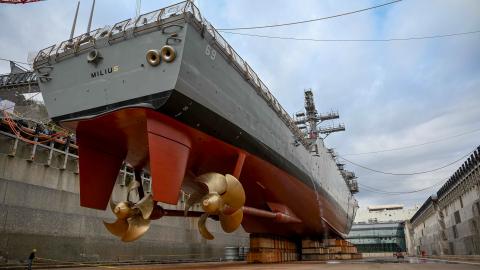
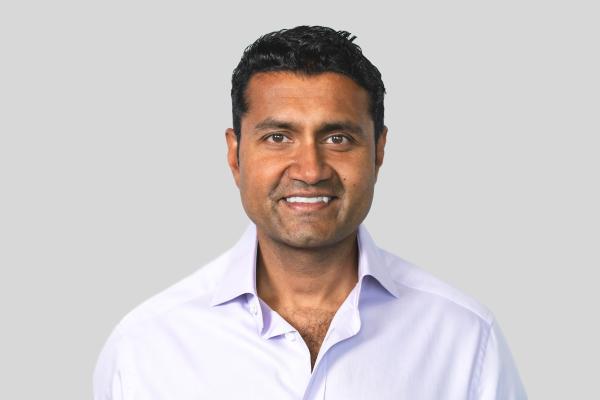
With Walter Russell Mead, Sankar will discuss his strategy to resurrect the American industrial base, win the twenty-first-century defense technology race, and prevent World War III.


Join Nina Shea for a discussion with Jan Jekielek, author of the new book Killed to Order, about this modern atrocity.
